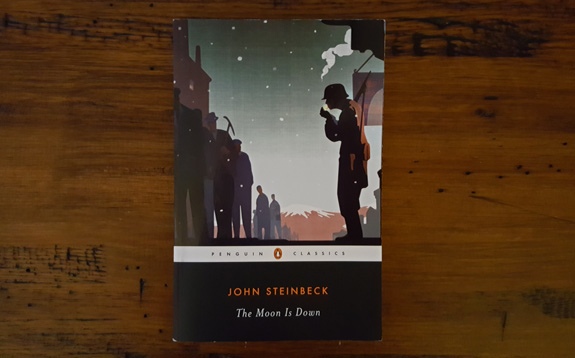Most of the John Steinbeck books I own are from the same Penguin Classics series, and one thing I like about them (other than the pleasing symmetry of their cover designs) is that they have an introduction by an academic putting the novel into its historical context.
That was particularly helpful for “The Moon is Down,” which was first published in 1942 and was one of the works Steinbeck did as part of his efforts to help the U.S. government’s information agencies.

The story is about a small town occupied by a foreign army. The town is not explicitly located on a map, nor is the army’s origin specifically laid out. But the town is in Europe and the army reports back to someone referred to as the “the Leader,” so it’s not rocket science.
In the introduction, Donald Coers writes that wasn’t Steinbeck’s original approach.
“By September 1941 Steinbeck had decided to write a work of fiction using what he had learned about the psychological effects of enemy occupation upon the populace of conquered nations. Because he ‘did not believe people are very different in essentials’ he originally set his story in America.”
But Foreign Information Service officials had concerns about what it would look like to have a story about a hypothetical American defeat, so Steinbeck went with the nameless European country instead.
The basic theme of the story is about the greater group of good people in the town and their efforts to stand up to the invaders through a combination of courage and cunning.
That was apparently mirrored in real life as people all over Europe made copies of the book and distributed it against the wishes of the real-life occupiers.
The New York Times in 1942 called it “the most memorable fiction to come out of this war.” (Subscribers you can search archives online going back to 1851! It’s awesome!)
“It is also a comforting book, for it shows why Hitler cannot triumph even if he continues to win victory after victory,” the Times said. “The flies can cover all the flypaper in Europe, but it will still be flypaper.”
